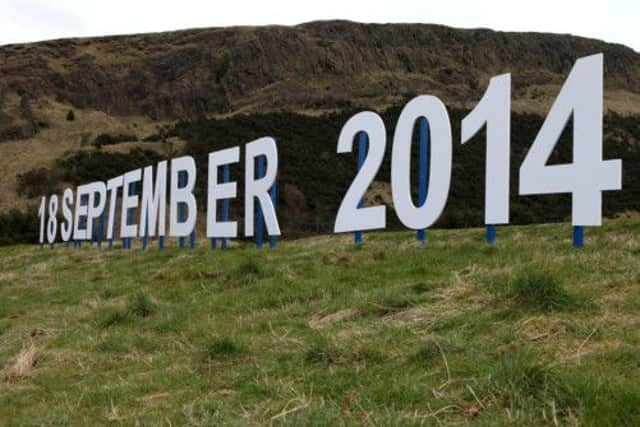Scottish independence:Undecided voters at new high


Nearly a third (31 per cent) told pollsters TNS that they do not know how they will vote on September 18 2014 in a poll of more than 1,000 people in Scotland.
The survey was conducted as the one-year countdown began last month.
Advertisement
Hide AdAdvertisement
Hide AdMore than half (53 per cent) of people south of the border want Scotland to remain part of the UK but a vast proportion (77 per cent) would still visit if Scotland left, a parallel TNS poll of 1,000 people in England and Wales also found.
The 3 per cent rise in undecided voters in Scotland from a previous TNS poll in August appears to have come from the No camp, which recorded a consequent 3 per cent drop to 44 per cent, while support for independence held steady at 25 per cent.
However, both sides have lost ground to the “don’t knows” since April when TNS found 30 per cent for independence, 51 per cent against and 19 per cent undecided.
The proportion of “don’t knows” is the highest recorded by any polling organisation since the referendum campaign began in earnest in 2011.
TNS has seen some of the biggest swings in the referendum campaign including the second highest support for independence at 39 per cent, with an unprecedented low of 38 per cent voting No, in the wake of the SNP’s landslide Holyrood victory in 2011.
However, it has also seen some of the lowest levels of support, with yes voters stuck on 25 per cent for two TNS polls running, the lowest level of support recorded by any pollster.
Of those who say they are certain to vote in the latest TNS survey, 28 per cent intend to vote Yes, 50 per cent intend to vote No and 22 per cent are undecided.
TNS said the result is evidence that both campaigns are failing to provide enough information to get their message across, with 44 per cent polled indicating they feel poorly informed against 31 per cent who feel well informed.
Advertisement
Hide AdAdvertisement
Hide AdTom Costley, head of TNS in Scotland, said: “The lack of information is particularly evident among the ‘don’t know’ group, of whom 60 per cent indicated that they were very much lacking the information they need compared to around four in 10 of the No voters and around three in 10 of the Yes voters.
“While we recognise that not all those in the ‘don’t know’ group are engaged in the debate, just under half (47 per cent) say they are certain to vote. Both camps need to be more convincing in their communications to this important constituency in order to make progress.”
The rest of the UK is split over Scotland’s worth to the UK, the latest TNS poll found, with nearly a quarter (23 per cent) saying the UK would be better off if Scotland left, over a quarter (26 per cent) saying it would be worse off and 37 per cent saying it would make no difference.
A third (34 per cent) think Scotland has too much influence in the UK Government but 42 per cent do not, while nearly three-fifths (59 per cent) do not think that Scottish independence would have an impact on the UK’s influence in the world.
Respondents south of the border were split on the future of Trident, with 37 per cent saying it should be rehoused in the UK, 29 per cent saying it should not and 34 per cent undecided.
The vast majority (77 per cent) are just as likely to visit an independent Scotland than they would if it remained part of the UK, with a tenth saying they would be less likely and one in twenty saying they would be more likely.
A Yes Scotland spokesman said: “Different polls report various results, but with nearly a year to go before the referendum the most significant figure in the TNS poll is the increase in the number of undecideds - 31 per cent, which is an increase of three points.
“We know from our own research that the more people learn about independence the more likely they are to vote Yes because they realise that having a government with full powers they vote for in Scotland is the best way to ensure our undoubted wealth is used to build a fairer, more prosperous country.
Advertisement
Hide AdAdvertisement
Hide Ad“Yes Scotland will be doubling our efforts to provide the quality information voters need to help them make the right choice.”
A Better Together spokesman said: “While it is always better to be ahead in the polls than behind, it is clear that it is still all to play for in the referendum.
“We have to make sure that we fight for every vote between now and polling day.
“If people believe that it is better for our jobs, our pensions and our taxes to stay part of the United Kingdom, then they have to come out and vote for it.
“However, it is great to see that, despite years of Alex Salmond and the SNP trying to create divisions between the people of the United Kingdom, the majority of people both north and south of the border want to stay together.”
• The Scotsman Conferences is hosting a series of events capturing the many facets of the Scottish independence debate. 3 December sees a formidable line up of expert speakers tackle “The Independence White Paper: A Business Plan for Scotland?” For more details on this and other great events please visit www.scotsmanconferences.com.